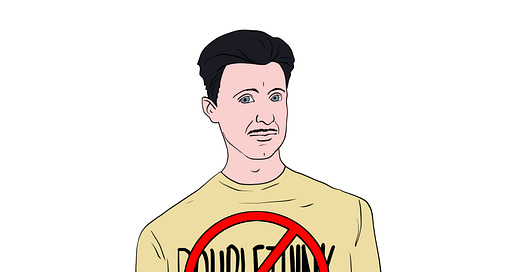
A key tenet of American’s civic religion is that the McCarthy-era persecution of Communists and Communist sympathizers was both paranoid and immoral. Academics are especially strident in their commitment to this tenet. And since they are academics, they’re especially dismayed by academia‘s persecution of Communists and Communist sympathizers. The most infamous form of this persecution: the loyalty oaths many universities imposed on their employees. Sign the oath, or lose your job.
What exactly did these loyalty oaths say? Here’s UC Berkeley’s Loyalty Oath of 1950.
Constitutional Oath (Constitution of the State of California, Article 20, Section 3)
“I do solemnly swear (or affirm, as the case may be) that I will support the Constitution of the United States and the Constitution of the State of California, and that I will faithfully discharge the duties of my office according to the best of my ability.”
As passed by the Regents, April 12, 1950
“Having taken the constitutional oath of the office required by the State of California, I hereby formally acknowledge my acceptance of the position and salary named, and also state that I am not a member of the Communist Party or any other organization which advocates the overthrow of the Government by force or violence, and that I have no commitments in conflict with my responsibilities with respect to impartial scholarship and free pursuit of truth. I understand that the foregoing statement is a condition of my employment and a consideration of payment of my salary.”
Notice the mild wording of this Loyalty Oath. A person who personally advocates the violent overthrow of the government could truthfully sign it as long as he belongs to no organization that shares his position. A philosophical communist in full sympathy with Stalin could truthfully sign it as long as he is personally an “impartial scholar” in “free pursuit of truth.” Needless to say, every species of democratic socialist could readily sign, as could every kind of anti-anti-Communist.
By way of contrast, let’s compare UC Berkeley’s new Diversity and Inclusion Oath. Well, it’s actually much more. An Oath merely requires you to parrot someone else’s words; what Berkeley now mandates is a self-authored Diversity and Inclusion Vow in order to determine eligibility for employment. The university then scores your Vow for orthodoxy. Part 1 of its rubric, “Knowledge About Diversity, Equity, and Inclusion” assigns you a prohibitively low score if your statement contains stuff like:
Little expressed knowledge of, or experience with, dimensions of diversity that result from different identities. Defines diversity only in terms of different areas of study or different nationalities, but doesn’t discuss gender or ethnicity/race. Discusses diversity in vague terms, such as “diversity is important for science.” May state having had little experience with these issues because of lack of exposure, but then not provide any evidence of having informed themselves. Or may discount the importance of diversity.
That’s right, merely “discounting the importance of diversity” virtually bars you from faculty employment. Imagine if the 1950 Oath required you to, “Affirm the great importance of the fight against Communism.” Or sanctioned those who merely “discussed anti-Communism in vague terms.”
The rubric continues:
Seems not to be aware of, or understand the personal challenges that underrepresented individuals face in academia, or feel any personal responsibility for helping to eliminate barriers. For example, may state that it’s better not to have outreach or affinity groups aimed at underrepresented individuals because it keeps them separate from everyone else, or will make them feel less valued.
This would be akin to a 1950 Oath that mandated support for current anti-Communist tactics. Something like: “For example, may state that it’s better not to support right-wing dictatorships because it creates the false impression that capitalism and democracy are incompatible.”
What’s afoot? Orwellian doublethink of the highest order. Sure, the hated 1950 Loyalty Oath seems far less onerous than the new Diversity and Inclusion Vow. But the people who refused to sign the 1950 Oath were heroes standing up for freedom of conscience. The people who question today’s orthodoxy, in contrast, are hate-mongers who need to be excluded from high-skilled employment.
Newspeak-to-English translation: Full-blown Stalinism is no big deal, a mere difference of opinion. Yet even tepid doubts about whether mandatory discrimination against high-performing groups has already gone far enough are anathema, anathema, anathema.
The post appeared first on Econlib.










Very good. I've listed it at https://www.rasmusen.org/rasmapedia/index.php?title=Loyalty_Oaths
and https://www.mitfreespeech.org/dei_statements.php.
See also:
"Today’s ‘Diversity’ Oaths Resemble 1950s ‘Loyalty’ Oaths," RealClearPolitics (May 12, 2022).
Then, the hapless members asked George the big question: Are you now or have you ever been?
George Anastaplo refused to answer. He could have truthfully said, No. End of story. His three-fold reply was that (1) the Constitution guaranteed freedom of association; (2) it was not illegal to belong to the Communist Party; and, most important, (3) it was totally improper for the Illinois Bar Association to ask him that question – or any question about an applicant’s political affiliation. His application to practice law was promptly denied . . .
George also received strong support from Leo Strauss, the great political philosopher ... George was never admitted to the bar. Instead, he taught political philosophy for six decades, wrote multiple books on political thought and civil liberties, eventually teaching at Loyola University’s law school.
I'm proud to say I cut back my donations to Cal by 95% two years ago. After reading this article and seeing the news about violent antisemitism, I'll eliminate the remaining 5%.